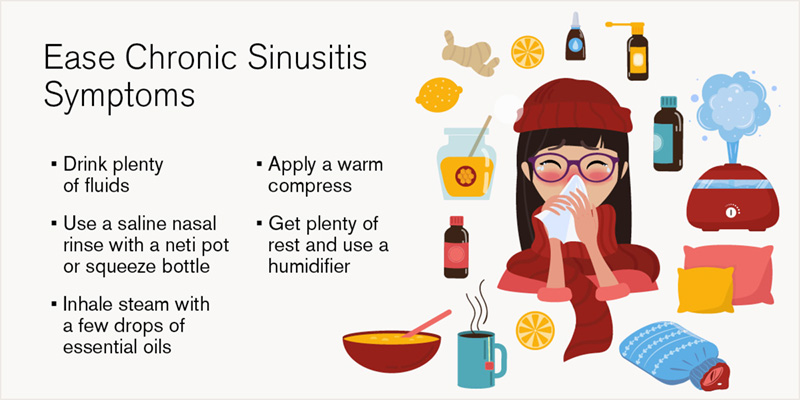Understanding Chronic Sinusitis: Causes, Symptoms, and Treatments
December 3, 2024
Categories: ENT/Otolaryngology
Tags: allergic rhinosinusitis, sinusitis, chronic rhinosinusitis
 By Chirag R Patel, MD, Otolaryngology
By Chirag R Patel, MD, Otolaryngology
Chronic sinusitis, also known as chronic rhinosinusitis or sinus disease, is a term used to describe a group of illnesses that cause persistent inflammation of the sinuses.
Unlike a typical sinus infection, which is usually temporary and caused by bacteria, chronic sinusitis can last for months or even years. The condition can vary greatly between patients, affecting daily life by making it difficult to breathe through the nose and often causing pain or pressure around the eyes, cheeks, and forehead.
"Chronic sinusitis is not just one thing. It’s a broad term that refers to persistent inflammation in the nose and sinuses, but there are many different causes that can lead to this condition," says Dr. Chirag Patel, an ENT specialist at Loyola Medicine.
What causes chronic sinusitis?
There isn't one single cause of chronic sinusitis. Instead, it can be triggered by a range of factors, including:
- Allergies: Exposure to allergens like pollen, dust, or pet dander can cause ongoing inflammation.
- Infections: Bacterial, viral, or fungal infections can lead to sinus blockages, though they are not always the primary cause.
- Immune system disorders: Conditions that affect the immune system can result in chronic inflammation of the sinuses.
- Environmental factors: Mold exposure, pollution, or even recent home renovations could be culprits. For some, prolonged exposure to irritants can contribute to ongoing symptoms.
In some cases, dental problems can lead to what is called odontogenic sinusitis, where issues with the teeth cause infections that spread to the sinuses. Understanding the root cause can be challenging so patients should expect to find relief, but not necessarily a cure.
“Chronic sinusitis is very similar to conditions like asthma. We often don’t have a clear answer for what’s causing the inflammation, but we know it’s there, and it affects quality of life," says Dr. Patel.
Common symptoms of chronic sinusitis
The symptoms of chronic sinus disease can be similar to those of acute sinus infections, but they persist over a longer period. These include:
- Nasal congestion and difficulty breathing through the nose
- Thick, discolored mucus from the nose or down the throat
- Pain, pressure, or tenderness around the eyes, nose, or forehead
- Loss of smell and taste
- Ear pain, jaw pain, or even headaches
- Fatigue and a general feeling of being unwell
"The symptoms can overlap with other conditions, which is why it’s important to pay attention to signs like persistent pain or pressure, frequent flare-ups, or loss of smell and taste. If these symptoms last for more than three months, it’s time to see a doctor," says Dr. Patel.

Diagnosis and when to seek help for recurrent sinusitis
Diagnosing chronic sinus disease can be tricky since the symptoms often overlap with other conditions like allergies or even migraines. There are also many conditions that cause inflammation of the sinuses.
A specialist, often an otolaryngologist (ENT), can help identify underlying causes by reviewing your symptoms, medical history, and conducting specific tests if needed. Sometimes imaging tests like CT scans are necessary to see what's happening in the sinus cavities. If you have frequent flare-ups or your symptoms span multiple seasons, it may be time to consult a specialist.
“A lot of patients come in thinking it’s just allergies or a common cold, but they end up having significant sinus disease. It’s always a good idea to get it checked out if you have persistent symptoms," says Dr. Patel.
Treatment for chronic sinus disease
There isn't a "one-size-fits-all" cure for chronic sinusitis, but there are several treatment approaches to help manage symptoms.
Steroids: These are the mainstay for reducing inflammation. Topical nasal sprays are common, and oral steroids may be prescribed for more severe cases.
Antihistamines: Helpful if allergies are a contributing factor.
Antibiotics: Only if there is evidence of a bacterial infection.
Saline irrigation: Regularly flushing out the nasal passages with saline solution can help clear mucus, allergens, and other irritants. Devices like neti pots or squeeze bottles are effective and safe if used correctly.
Surgery: If medication does not help, surgery might be an option. The goal is not to cure the inflammation but to improve airflow and drainage by removing blockages. This allows medications to reach deeper into the sinuses for better management.
It's important to note that surgery is often a means to an end, not a cure. Some patients experience significant relief after surgery, while others may continue to have flare-ups and need ongoing management.
Living with chronic sinusitis
Managing chronic sinusitis involves a combination of treatments, lifestyle adjustments, and sometimes environmental changes. For example, reducing exposure to known allergens or using a humidifier at home can help keep symptoms in check. Regular follow-ups with a healthcare provider are also key to adjusting treatments as needed.
If you're struggling with chronic sinusitis, consider consulting a specialist who can help tailor a treatment plan suited to your condition. While it may not be entirely curable, effective management can make a significant difference in your quality of life.
“For me, it’s always about improving quality of life. My goal is to help patients breathe better, reduce their flare-ups, and make their symptoms more manageable," says Dr. Patel.
Chirag Rajan Patel, MD is an ear, nose, and throat doctor at Loyola Medicine. Dr. Patel attended Philadelphia University and Thomas Jefferson University for his medical degree. He then pursued his residency training in otolaryngology and head and neck surgery at Rutgers.
Book an appointment today by self-scheduling an in-person or virtual appointment using myLoyola.
